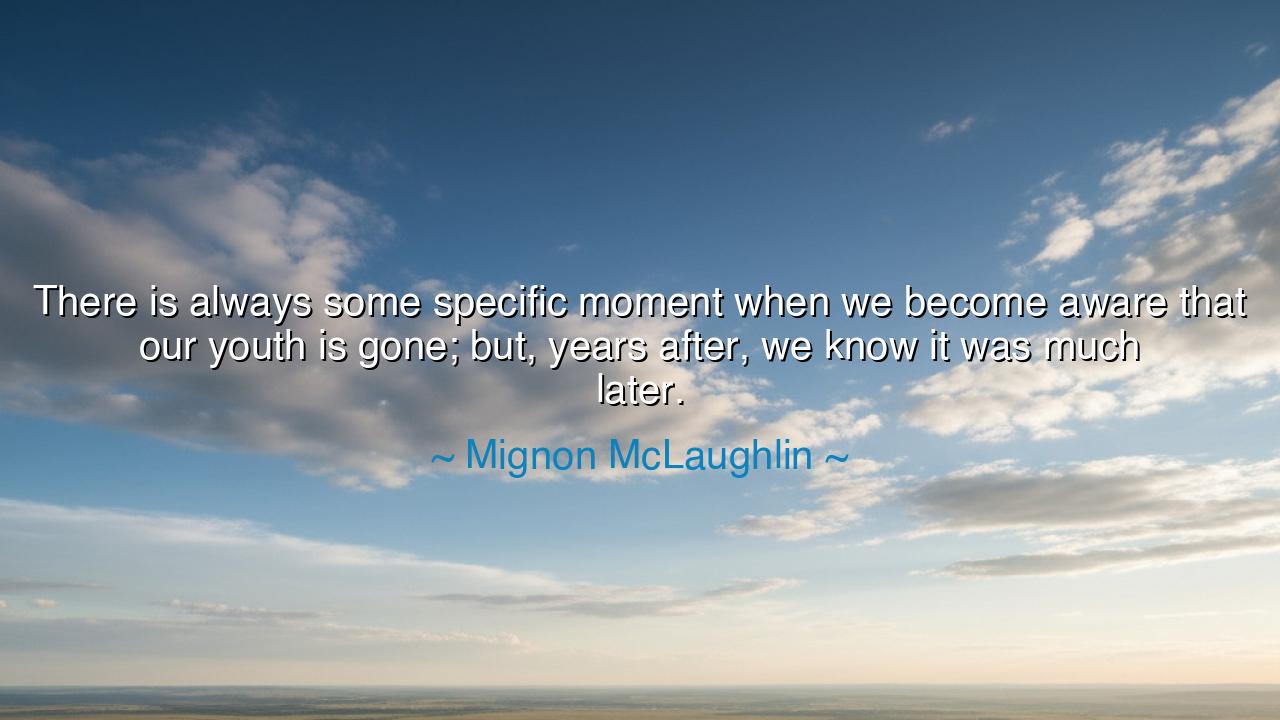
There is always some specific moment when we become aware that
There is always some specific moment when we become aware that our youth is gone; but, years after, we know it was much later.






"There is always some specific moment when we become aware that our youth is gone; but, years after, we know it was much later." - Mignon McLaughlin. These words echo the quiet and inevitable passage of time, reminding us that youth, that vibrant and fleeting period of life, slips away without us fully realizing it. McLaughlin reflects on how the realization of aging does not come in a single, sudden moment, but as a series of small, unnoticed steps. There is a specific moment—perhaps when we first feel the weight of a decision, the first sign of fatigue after a long day, or when we see a change in our physical appearance. But, as the years stretch ahead, we come to understand that the end of youth was not a single point in time but a gradual transition, a process that was unfolding even as we lived through it.
Consider the life of Alexander the Great, whose ambition and conquests consumed him in his early years. At the height of his power, it would have been unthinkable to imagine the decline of his vigor or the slowing of his mind. Yet, as he grew older, even he began to feel the toll of his youth spent in constant battle and leadership. The realization that he had passed into a new phase of life was not a single moment but the slow accumulation of experiences, where his body began to betray him, and his once-unlimited ambition was tempered by the realities of his mortality. Alexander’s life, like McLaughlin’s quote, shows that the end of youth often comes quietly, and it is only in retrospect that we recognize when it truly passed.
This gradual shift is central to the human experience. The Romans believed that wisdom and strength did not reside solely in youth but grew deeper with age. Yet, they also recognized that a man must be careful not to lose his vigor and enthusiasm along the way. In ancient times, as in today’s world, the realization that youth has slipped away often comes not when we expect it, but when we look back, after time has passed. The philosopher Seneca, though focused on stoicism and the acceptance of time’s passage, also understood that aging is something that catches us unaware. Even he, in his reflections, noted how age sneaks up on a person like the tide, and only when we look back do we realize that we have crossed a threshold we did not feel in the moment.
This truth is also reflected in the lives of great writers like George Orwell. In his final years, Orwell, though a man deeply aware of the passage of time and the shifts in his own health, continued to produce work that was vital, even revolutionary. But his declining health and the pain of old age crept up on him, and it was only later, after his death, that the world recognized how much of his youthful idealism had shifted into the mature, reflective wisdom that he left in his writings. His life mirrors McLaughlin's quote: the moments of youth’s passing were not marked by dramatic events but were instead a series of quiet transitions that became evident only when one looked back with the clarity of time.
The lesson here is both powerful and humbling. As we live our lives, we are so immersed in the present moment that we rarely notice the gradual changes that are taking place within us. Youth is not something that disappears all at once but fades gradually, almost imperceptibly, until we find ourselves reflecting on it years later. The realization that youth is gone comes not with a single event, but with the accumulation of experiences, small shifts, and subtle shifts in perception. We may look back at the days of our youth with longing, but we must also recognize the strength that comes from embracing maturity and wisdom—qualities that are often born of the very experiences that signal the end of youth.
In practical terms, this wisdom encourages us to live fully in the present moment, knowing that time is an unseen river, gently flowing past us, unnoticed until we see how far we’ve come. Do not wait for some grand realization of aging but embrace each stage of life with the understanding that youth is not lost, but transformed. Stay curious, remain enthusiastic, and never lose sight of the passion that drives you. Even as the years pass, let the essence of youth live in your spirit—for as long as you continue to grow, learn, and engage with the world, you will never truly be “old.”
Finally, let McLaughlin’s words serve as a reminder to honor each moment of life, to embrace the gradual and inevitable passage of time, and to find joy not just in youth but in the depth and richness that comes with every phase. Even as the body ages, the mind and spirit remain capable of growth, and if we hold on to hope, we may find that the transition from youth to maturity brings new dimensions of understanding, purpose, and fulfillment that are as vibrant as the dreams of our youth.






AAdministratorAdministrator
Welcome, honored guests. Please leave a comment, we will respond soon